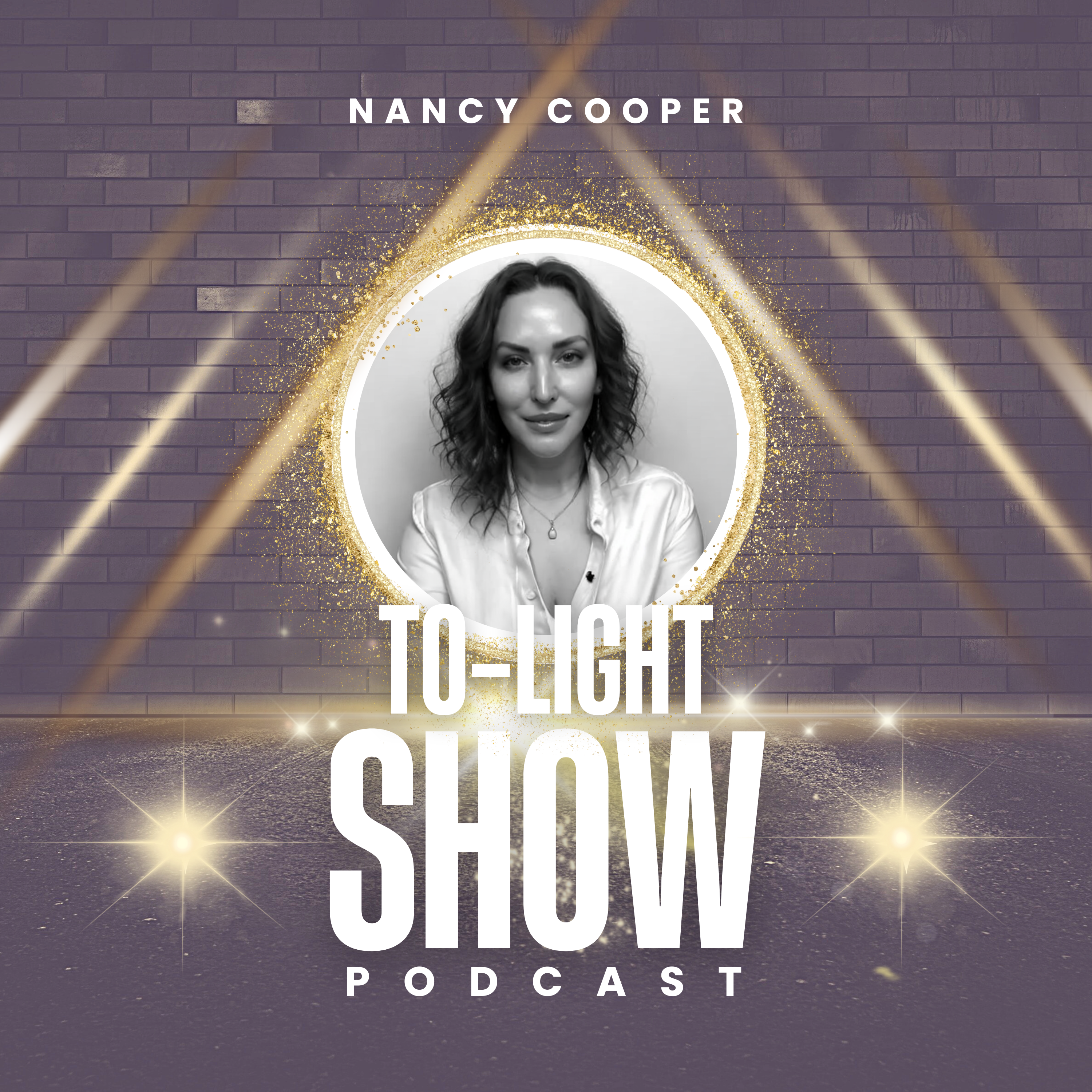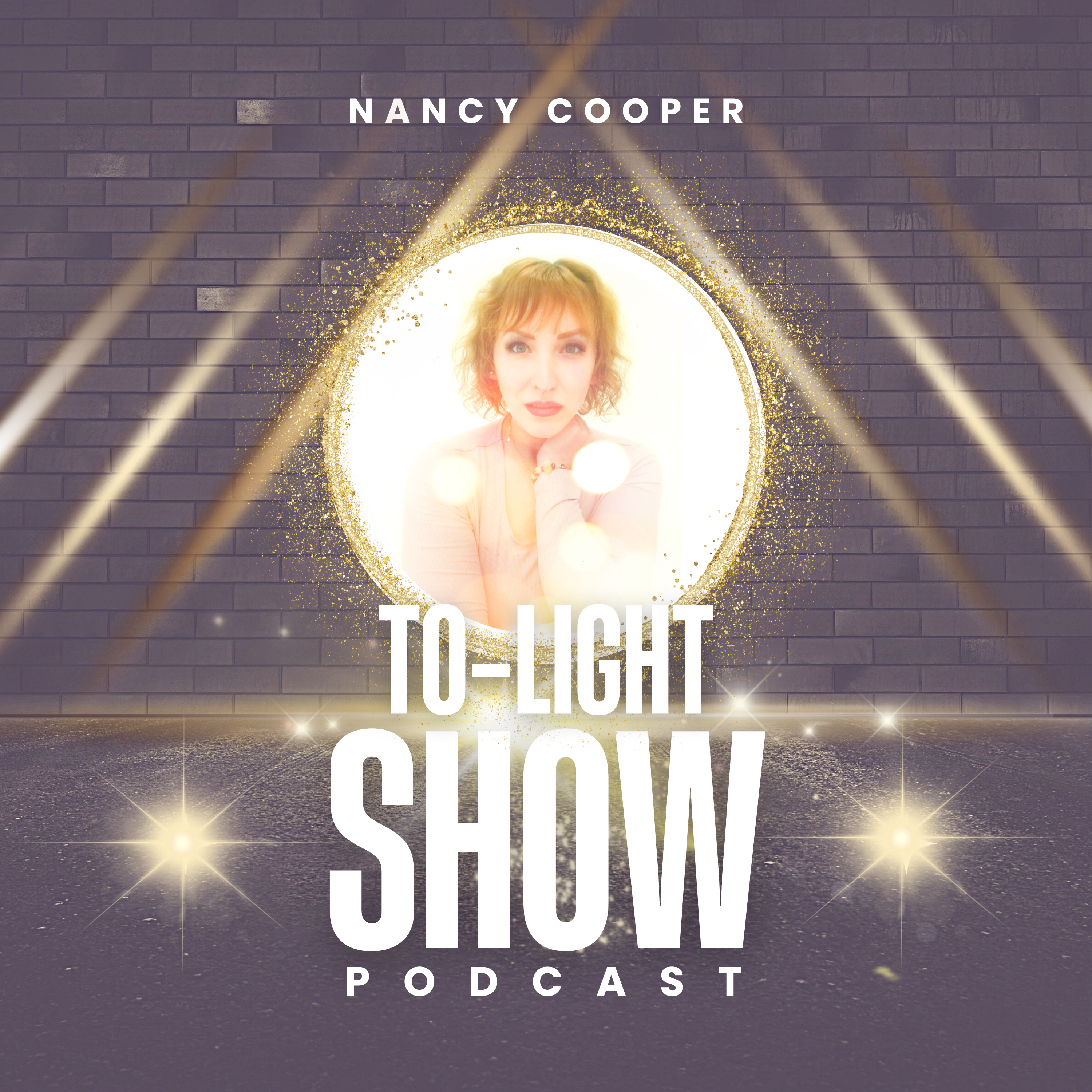Episode Transcript
Speaker 0 00:00:00 Hello and welcome. This is Nancy Cooper from The Light Show. Today I wanna talk about why it's so important to lean in. This is something that my one-to-one clients hear a lot from me, um, probably to an annoying amount <laugh>, but it, it's definitely something that's incredibly important, that is something that is so insanely transformational. So a lot of times when we are healing, we're wanting to level up, we're trying to get rid of blockages, we're trying to, you know, step into that next level. We have so much subconscious resistance, okay? So that resistance, we're not aware of it. This is why it's subconscious, but it's playing out in our reality. And what happens is sometimes when we get feedback, we feel like we're being punished, right? We feel like, what have I done wrong? Why is this coming up like this? Why is this happening to me?
Speaker 0 00:01:07 Um, you know, if you're feeling <laugh>, like, why is she talking directly to me? Right? It's like, yeah, this, this happens. Or like, why? Like, I don't understand. Why is this happening again? What's going on with this? It's all feedback. So the important thing that we have to remember is that the feedback is there for us to learn. It is not there as a punishment. It is not there to hurt us. It is not there to harm us. It is not there with the intention of just making us frustrated and it feeling difficult. It is there purely as feedback to show us where we are. And so once we can start acknowledging it for what it is, we can start connecting with it in that way, outweigh. That's when we start healing. That's when we start loving up. Because what we do and what I, I tell my clients, this is exactly what I say.
Speaker 0 00:02:14 We have to sit with it. Okay? So instead of trying to avoid it, instead of trying to, you know, just start dating someone else, or instead of, um, not wanting to feel lonely, so we just go out instead. It's like we do these things so often to try to not feel what we're feeling. And the first step of this process is to sit with it. Stop trying to ignore it. Stop trying to make it go away. Stop trying to, um, you know, drink it away. Have sex <laugh>, you know, to distract different things. Um, substances, workaholic stuff. You know, like, stop. We have to stop. Just stop doing this. And we have to start sitting with it. We have to sit with it. And then once we sit with it, we lean in. This is such a profoundly powerful process and thing for us to start doing.
Speaker 0 00:03:20 The first step is really the most challenging, because this means that we have to start practicing regulating our own nervous system. What happens when these things come up, right? We don't want to deal with it. We don't wanna feel it. We don't wanna feel those triggers. We don't wanna feel that kind of stuff. So we try to do something to distract ourself. And the key is to learn strategies and techniques, things to do to help us be able to sit with it, to help us be able to be present with our pain, present with that discomfort and being in that space so that we can address it, so that we can be there for ourselves in it. And so that we can start to understand what it's trying to teach us. Because it will continue to happen. It will continue to replay, it will continue to show up until we acknowledge it, process it, and heal it.
Speaker 0 00:04:17 There's no running from it. We cannot run from it. So as much as while we sit there, if we wanna, you know, go out for a run, or we just work, you know, 18 hours a day, it's, it's not going away. It will only go away once it's processed, period. There's, there's no way around this. There's no magic trick. There's no, oh, if I just, you know, exercise more, or do this more, or do that more or whatever, then it's gonna stop hurting and it's gonna go away. It will never go away until it is healed, transmuted and processed, period. There's just no way around it. Okay? So please hear this. Please understand this. Please remember this truth. All right? So we sit with it. What does that mean? Okay, what does it mean to sit with it? Really what I've already said, stop trying to make it go away.
Speaker 0 00:05:14 Sit, be still, spend that time with yourself and be very, very much, um, introspective. Study yourself. Ask, be inquisitive. What is this? What's coming up? Why is this coming up? What's behind this feeling? I recommend journaling exercises a lot where it's like, you know, getting it out. Why are you feeling this way? What's coming up with this, um, writing, you know, um, a letter to the person that activated this, that we're not gonna send that's in our journal, that's private, but talk to them about what you're feeling. Share with them what's coming up. Because this is all going to give
Speaker 1 00:05:56 You you information about what's really going on, about what's really being activated in your body, in your dna, in your soul, in your heart. It's going to start giving you these very, very valuable nuggets of information. So we have to acknowledge it and sit with it. So say we, um, we've been talking to someone, okay? We we're dating, we're talking to someone, and you know, something happens. You say speak your truth, and then they ghost you. Okay? So a natural thing for us to wanna do is, well, I'm just, let me just go find someone else, right? So we wanna go find someone else. We just, it hurt. We don't, you know, like to feel that way. So it's like, well, how do I distract myself? I'm gonna talk shit about him, right? I'm going to just go find someone else. Um, or, you know, I'm gonna get mad and give up on dating and, you know, be in that energy.
Speaker 1 00:07:04 So something else to replace that feeling of rejection, right? Versus the lean in, sit with it. Technique is, okay, I was ghosted. This effing hurts. I feel rejected, I feel insignificant, I feel unimportant. Like, how do I feel? How is this making me feel? And then finding why, why does this, why does that person's behavior make me feel this way? Why is it because I was so attached to the outcome and I thought this person was the one and when they did this, you know, uh, I was too attached and now it hurts because I don't wanna let it go. Uh, you know, all of these different things, these are things that make us keep playing out the, the cycles, right? So it's like we would be the one that when they came back, because let's be real ghosters always come back, right? Um, so we would be the one to like take them back after making them work a little bit for it, right?
Speaker 1 00:08:13 Because we would repeat the same cycle cuz we haven't learned the lesson. So this is why we sit with it. And we lean in because we're looking for the lesson here. Okay? What in me, what in me aligned with this? What in me feels like I am someone to be rejected? What in me is already feeling rejected? Why did this come up in my reality of rejection? Where do I need to heal this? What is coming up here? So this is why first we sit with it because we're, we're being an investigator, right? We're investigating what, what happened here
Speaker 2 00:08:54 Really because this person, their behavior, this stuff is all just a mirror reflecting back to me what's happening in my internal world. So this happens, we see it, we witness it, and then we allow it to show us what is there. And that's when we lean in, we're leaning into it instead of like avoiding and backing away. We sit with and acknowledge the feelings and then we really lean into them. So where have I been rejected? Where did this start? My childhood? Who rejected me first? I'll give you a hint. Probably your mother wound. Um, that's, that's the rejection wounding. Um, and we'll see that when we had this rejection wounding in our childhood, that we typically, um, find ourselves subconsciously attracted to people that will ghost. Or that even when we're in a relationship, when they get mad or we have a fight, they, they disappear for a few days, right?
Speaker 2 00:09:49 Because we're replaying out a cycle that we already know. Um, so this is, this is why we sit with it so that we don't have to continue to repeat it and play it out again. Uh, we, we go, okay, this makes me feel really rejected. So where did this rejection feeling start? Where is this com? Like why is this reverberating in my body so therefore repeating in my reality? So we sit and we lean into this and look at it going back, okay, when, when did I most feel rejected? When did I most feel this? And then finding that and allowing ourself to do the work to heal that, because that is what is causing everything to cycle. Again. This is what's creating the karmic loop that we are experiencing where it feels like we just keep repeating the same thing over and over, over again.
Speaker 2 00:10:47 Until we find the attachment, until we find the lesson and we clear and heal it, it will continue. Now, once you find it, this is, this is where you have to learn the skills to clear and heal it. Um, people like me do that for, for clients. We go in and we find it together. If you're struggling to do that, that is something I personally can help you with, where we go in and find it and we, we clear it together. And then it's very interesting to see how the cycle stops. We're no longer attracted to the same type people. We're no longer attracted, um, to the same types of situations. We're no longer at like attached and addicted to that type of drama because it gets cleared out of our system and we are able to step off that, that karmic wheel and get out of that karmic loop. So this is why it's so important to sit with it and lean in. I will talk to you guys later. Thank you. And namaste.


